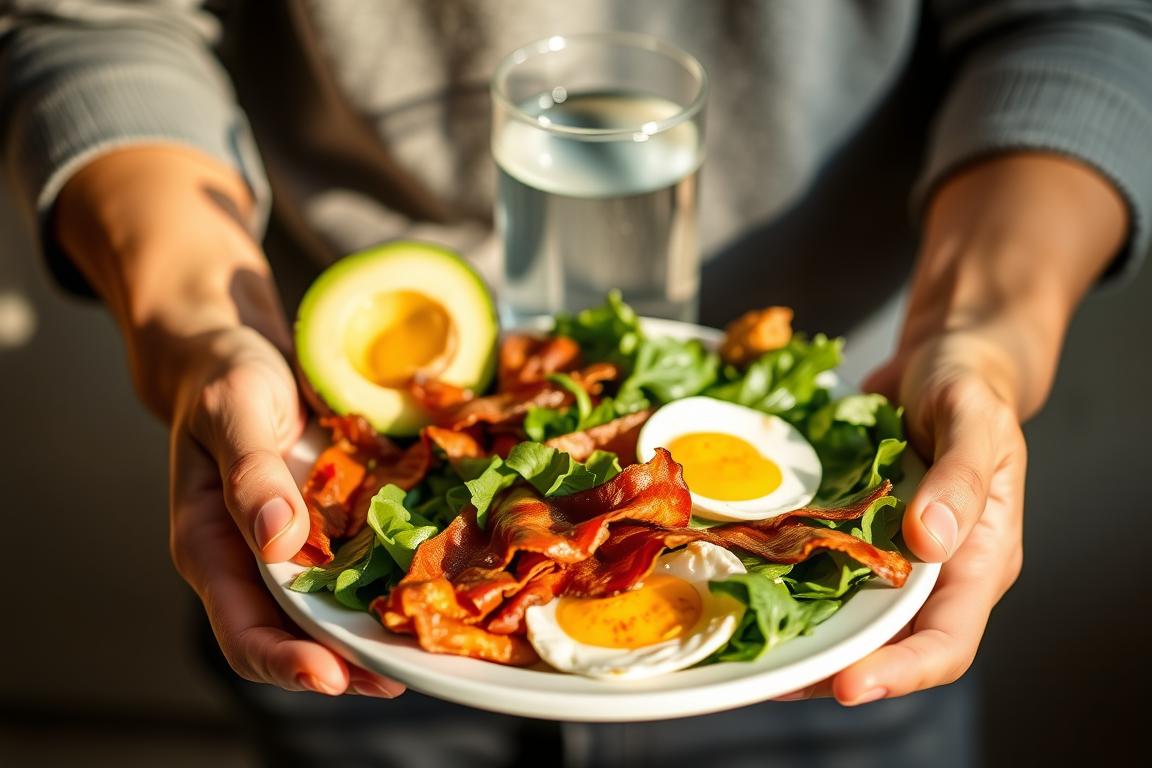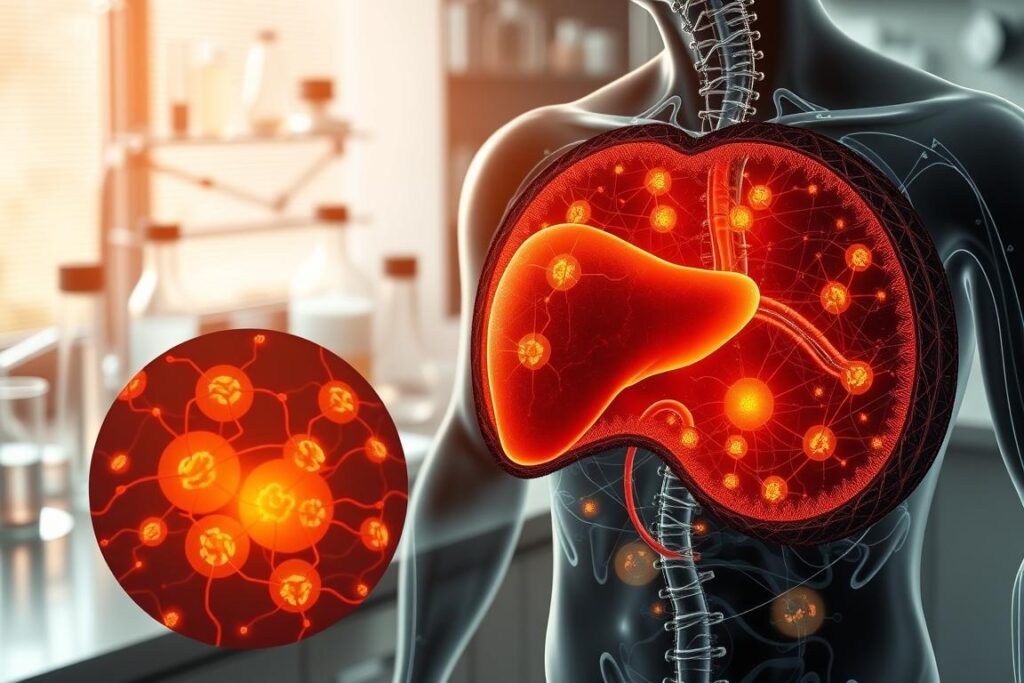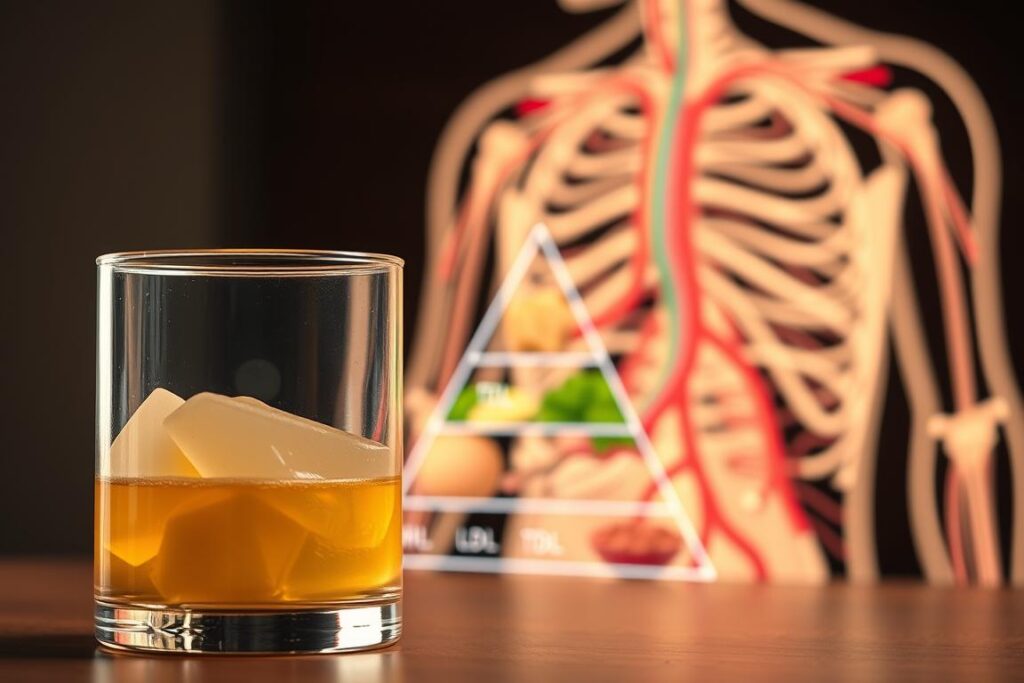Physical Address
304 North Cardinal St.
Dorchester Center, MA 02124
Physical Address
304 North Cardinal St.
Dorchester Center, MA 02124

Discover the relationship between Keto and Cholesterol: Does It Raise LDL? Learn about the impact of a ketogenic diet on your cholesterol levels and heart health from expert research.
A surprising 73% of individuals on a low-carb high-fat diet see big changes in their blood lipid profiles in just three months. This shows why we need to look closely at how keto diets affect heart health.
The keto diet has become very popular for losing weight. People enjoy eating foods like avocados, eggs, and fatty meats. But doctors are worried about its long-term effects on the heart.
Studies show mixed results. Some say it can improve metabolic health by lowering triglycerides and raising HDL (the “good” cholesterol). But others warn of high LDL levels in some people.
What’s interesting is how people react differently. Two people eating the same foods can have very different cholesterol levels. This might be because of genetics, starting health, and the specific foods chosen in the keto diet for weight loss.
The ketogenic diet is different from usual diets because it cuts down carbs and boosts fat. This low-carb high-fat diet is popular for losing weight and improving health. It can help with mental focus and blood sugar control.
Ketosis is the core of the ketogenic diet. It happens when you eat less than 50 grams of carbs a day. Your body then uses fat for energy instead of carbs.
This change makes your body burn fat instead of carbs. People often feel more energetic and clear-headed when in ketosis.

The ketogenic diet plan has a unique mix of nutrients:
This diet focuses on fats from foods like avocados, olive oil, nuts, and fatty fish. Foods high in carbs and sugar are avoided.
There are many keto diets to fit different needs and goals:
Each diet keeps the core idea of ketosis but offers flexibility. This is for athletes or people with health conditions like epilepsy.
Cholesterol is more than just “good” and “bad.” It’s vital for health and how cells work. Knowing what cholesterol is and its role in your body is key before we dive into keto’s effects.
Cholesterol isn’t alone in your blood. It rides with lipoproteins, which come in different types:
Not all LDL is bad. Smaller, dense LDL is worse than larger, fluffier LDL. This is why some foods on keto-friendly food lists can affect particle size.
Apolipoprotein B (apoB) is also key. It’s in LDL and linked to heart disease. Many think apoB is more important than total LDL for heart disease risk.

Cholesterol isn’t just a bad guy. It’s essential for many functions:
Without enough cholesterol, these important processes wouldn’t work. This is why our bodies make about 75% of the cholesterol we need, even if we don’t eat much of it.
For years, high total cholesterol and LDL were seen as heart disease risks. This led to eating less cholesterol and saturated fats.
But, this view is changing. New studies show the link between diet, blood cholesterol, and heart disease is more complex.
Many keto success stories show better cholesterol levels, even with more fat. Some see higher HDL, lower triglycerides, and better LDL particle size. These are all good signs for heart health.
This complexity explains why a high-fat diet like keto might not harm heart health as much as thought. The next section will explore how keto affects cholesterol in more detail.
Whether keto raises LDL cholesterol is complex. Research shows many factors at play. While keto success stories often highlight health improvements, cholesterol effects vary greatly. It’s key to understand these differences for those on or thinking about a ketogenic diet.
People on keto often see changes in their lipids. HDL (good cholesterol) usually goes up, and triglycerides drop—a good sign for heart health. These changes are common in keto success stories, showing better cholesterol ratios.
But LDL cholesterol changes are not the same for everyone. Some see no change, others a small increase, and a few a big jump. Studies suggest these changes often settle down after a while, with the right keto fat burning tips like choosing good fats.

Looking closer at LDL reveals more. Keto diets often make LDL particles bigger and less harmful. This is good news for heart health.
Doctors are less worried about a bit higher LDL on keto if other health markers are good. The standard test doesn’t show particle size, which is important for heart risk.
Cholesterol reactions to keto are very different for everyone. Some, known as “Lean Mass Hyper-Responders,” see big LDL jumps, even over 200 mg/dL.
A study showed keto dieters’ LDL went up by 187 mg/dL over 12 months—a huge 245% rise. But when they stopped keto, their LDL dropped by 174 mg/dL. This shows the effect can be reversed.
Genetics likely affect who sees these big changes. Using keto fat burning tips like changing fats or fasting can help manage lipid changes while keeping keto benefits.
The science on fat intake and cholesterol is more complex than many think. It’s not true that all fats raise cholesterol. The type of fat and how your body processes it matter. Knowing this can help you lose weight on a keto diet and keep your cholesterol healthy.
Not all fats are the same when it comes to your blood lipids. Saturated fats, found in red meats and dairy, were once thought to raise LDL cholesterol. But, new studies show different saturated fatty acids have different effects.
For instance, stearic acid in dark chocolate barely affects LDL. But, palmitic acid in palm oil might raise it more. People who lose a lot of weight on keto often eat more saturated fats than others.
On the other hand, unsaturated fats like those in avocados, olive oil, and nuts can improve your cholesterol. They raise HDL (good cholesterol) and might lower LDL. Adding these fats to your diet can help balance your lipid levels while on ketosis.
When you cut down on carbs, your body changes how it handles fats and cholesterol. The liver starts to process more fat because it’s not dealing with as many carbs.
This change can lead to better triglyceride levels and higher HDL cholesterol. Without insulin spikes from carbs, your body burns fat more efficiently. This is why many people lose weight quickly on keto.
Interestingly, people with lower BMIs tend to see bigger increases in LDL cholesterol on keto. This shows that how your body responds to diet changes depends on your body composition.
New studies are changing how we view cholesterol and heart health. Instead of just looking at LDL, we now consider LDL particle size and number.
A 2020 study found that while some people on keto had higher LDL, they also had better inflammation markers and insulin sensitivity. This shows that we need to look at cholesterol changes in the context of overall health.
Another key finding is that cholesterol levels tend to stabilize after 6-12 months on keto. This means initial increases might be a temporary adjustment, not a permanent change. It’s important to monitor cholesterol levels over the long term, not just in the short term.
The ketogenic diet can lead to quick weight loss, but it might also change cholesterol levels. When you start burning fat, your body’s metabolism changes. This can affect your blood lipid levels in ways you might not expect.
It’s important to understand how fast weight loss and cholesterol changes are connected. This knowledge helps make sense of your test results during your keto journey.
For rapid weight loss on keto, a clear plan is key. Start by eating less than 20 grams of carbs a day. This depletes glycogen and starts ketosis.
Keep protein intake moderate, around 0.6-0.8 grams per pound of body weight. This helps keep muscle while burning fat.
Choosing the right fats is also important. Eat enough to feel full but not too many calories. Good fats include avocados, olive oil, and fatty fish.
Drinking plenty of water is essential when trying to lose 10 pounds in 2 weeks on keto. Aim for 3-4 liters a day to aid metabolism and remove toxins. Intermittent fasting, like 16:8, can also boost fat burning.
Results can vary a lot. Weight loss speed depends on your starting weight, health, and how well you stick to the diet. Those with more weight to lose often see faster results.
When you lose fat quickly, like in the first weeks of keto, fat cells release cholesterol into your blood. This can raise your blood lipid levels, including LDL cholesterol. But, research shows these changes might not mean you’re at higher risk for heart disease.
This “fat adaptation” phase can make cholesterol readings seem scary to doctors who don’t know about keto. A study found that stopping the keto diet can lower LDL cholesterol by 174 mg/dL, a 220% drop. This shows how diet can greatly affect cholesterol levels during big changes.
When you’re losing weight fast, it’s best to wait to get cholesterol tests. Tests done during this time might not show your true cholesterol health. Doctors often suggest waiting until your weight stabilizes before making conclusions about cholesterol.
After the initial weight loss, cholesterol levels usually stabilize. Studies show that many people see their cholesterol levels normalize or even improve after months of keto. HDL cholesterol often goes up, and triglycerides go down, both good for your heart.
But, some people might keep high LDL levels, even after adapting. They might need to adjust their keto diet, like changing fat sources or adding more fiber-rich veggies.
It’s important to understand the difference between short-term and long-term cholesterol changes. Long-term trends are more important than single test results, during big weight changes. Working with doctors who know about low-carb diets can help understand these changes and decide if any changes are needed.
To keep your heart healthy on a keto diet, pick the right fats and foods. High fat intake is key, but the types of fat matter a lot. Choosing wisely can help you stay in ketosis and keep your heart healthy.
Not all fats are good for your heart. Monounsaturated and polyunsaturated fats are best. They can improve your cholesterol and keep you in ketosis.
Here are the top fats for heart health on keto:
While some saturated fats are okay, limit processed meats. Choose grass-fed options to keep cholesterol levels healthy.
Many low-carb foods are great for cholesterol while fitting into your keto diet. Eating these foods regularly can balance your lipids:
Plan your meals to support heart health on keto. Use 70-75% of your calories for healthy fats, 20-25% for proteins, and 5-10% for carbs.
Here’s a daily meal plan:
Plan your week with fatty fish, veggies, and minimal processed foods. This keeps you in ketosis and supports your heart.
Keep an eye on your cholesterol every 3-6 months. This helps you adjust your diet for better heart health.
Pairing intermittent fasting with keto is gaining popularity. It aims to boost fat burning and cholesterol levels. This combo uses your body’s natural fasting state to enhance ketosis.
Going to bed a bit hungry starts your body on ketosis. This happens while you sleep.
There are many fasting methods that pair well with keto. Each has its own benefits, depending on your goals and lifestyle:
Fasting with keto boosts fat oxidation. This can improve more than just weight loss. It may also increase insulin sensitivity and reduce inflammation, affecting cholesterol.
One key keto fat burning tip is to extend your overnight fast to 16 hours. This allows your body to burn more fat. It may also balance cholesterol levels seen with keto alone.
It’s important to test your health regularly when fasting and keto. Check:
Take baseline tests before starting intermittent fasting keto. Then, retest every 3-6 months. This helps see how your metabolism reacts to this diet combo.
People with certain risk factors or genetic predispositions need to watch their cholesterol levels more closely on keto. While many see positive changes in their lipid profiles, others might need a more tailored approach. This ensures their heart health stays safe.
Your genes greatly influence how your body reacts to a high-fat diet. Some, known as “Lean Mass Hyper-Responders,” see a big jump in LDL cholesterol—sometimes over 200 mg/dL—on keto. These individuals are usually lean and fit.
Research has found specific genetic variants that affect cholesterol response on keto. For example, changes in the LDL receptor (LDL-R) gene can impact cholesterol processing. Your apolipoprotein E status also plays a role in lipid transport and cholesterol metabolism.
If you have heart disease, a history of stroke or heart attack, or familial hypercholesterolemia, consider the risks of a keto meal plan for weight loss carefully. For these individuals, a modified approach might be better.
Try a Mediterranean-keto hybrid diet. It focuses on unsaturated fats from olive oil, avocados, and fatty fish. This might help avoid cholesterol issues while keeping keto’s benefits.
It’s important to find healthcare professionals who know about ketogenic diets and lipid metabolism. If you’re starting keto with cholesterol concerns, ask for detailed testing. Tests that measure LDL particle size and number are more informative than standard cholesterol tests.
Make sure to have regular check-ups to track your lipid profile changes. Some might need medication along with dietary changes if cholesterol levels are a concern.
Remember, everyone’s body is different. What works for others might not work for you. Be ready to adjust your keto plan based on your body’s unique needs. This ensures you enjoy keto’s benefits without risking your heart health.
The ketogenic diet has many benefits. People often lose weight, feel more energetic, and think clearer. They also burn fat quickly.
But, the diet’s effect on cholesterol is not simple. Everyone’s body reacts differently. Some see better cholesterol levels, while others might need to watch their LDL.
Before starting keto, get your bloodwork checked. Eat healthy fats like avocados, olive oil, and fatty fish. These choices can help with weight loss and heart health.
Keep an eye on your cholesterol levels after starting keto. Get lipid panels every 3-6 months, at least in the first year. If your LDL goes up too much, talk to a doctor about changing your diet.
What works for one person might not work for another. Your diet should match your genes, health history, and goals. Stay updated on new research about keto and heart health.
By carefully watching how keto affects your cholesterol, you can decide if it’s right for you. This way, you can make choices that support your long-term health.
The ketogenic diet’s effect on LDL cholesterol varies. Many people see no change or even better lipid profiles. But, some might see LDL levels go up, which could be a concern.
It’s important to note that the quality of LDL matters. On keto, LDL often becomes larger and less harmful, even if it goes up.
Ketosis is when your body starts burning fat for energy instead of carbs. This happens when you eat very few carbs (less than 50g daily). It changes how your liver handles fats, which can lower triglycerides and raise HDL.
But, LDL can react differently for everyone. It depends on your genes, the fats you eat, and your overall health.
No, not all LDL particles are bad. The size and number of LDL particles are more important than just the total amount. Small, dense LDL particles are worse for your heart than large ones.
The keto diet often makes LDL particles larger and less harmful. But, more research is needed to fully understand this.
Losing weight quickly on keto can make your cholesterol levels change. This is because fat cells release cholesterol into your blood. This can make LDL levels go up temporarily.
But, for most people, cholesterol levels will get better over time. It just takes a few months for your body to fully adapt to burning fat.
Focus on monounsaturated and polyunsaturated fats for heart health on keto. Good sources include olive oil, avocados, fatty fish, nuts, and seeds. These fats can help improve HDL and reduce inflammation.
Adding omega-3 fatty acids is also great for your heart.
Yes, combining keto with intermittent fasting can be good for cholesterol. It improves insulin sensitivity and reduces inflammation, which can help your cholesterol levels. This combo can make your body burn fat better and might lower cholesterol levels.
Popular fasting methods include 16/8, OMAD, or 5:2.
People with certain genetic conditions, heart disease, or a family history of heart disease should be careful. Those with familial hypercholesterolemia or established heart disease should work closely with their doctors. They might need to monitor their cholesterol more often and consider a modified keto diet.
Ask for advanced lipid tests like LDL particle size and number, ApoB, lipoprotein(a), and hs-CRP. These tests give a better picture of your heart risk than just standard cholesterol tests. Get baseline tests before starting keto and check again every 3-6 months to see how you’re doing.
To lose 10 pounds in 2 weeks on keto, eat less than 20g of carbs daily. Choose heart-healthy fats like olive oil and avocados. Make sure to eat enough protein and stay hydrated. Consider intermittent fasting too.
Eat plenty of non-starchy veggies for fiber and nutrients. Remember, initial weight loss is mostly water. Keep an eye on your cholesterol and adjust your diet if needed.
If your LDL goes up a lot on keto, you have options. Try changing your fat sources to monounsaturated and polyunsaturated fats. Make sure you get enough fiber from veggies. You could also try a Mediterranean keto diet with more plants.
If these changes don’t help, talk to your doctor about carb cycling. Or, you might want to try a less strict low-carb diet (50-100g carbs daily) for better cholesterol effects.